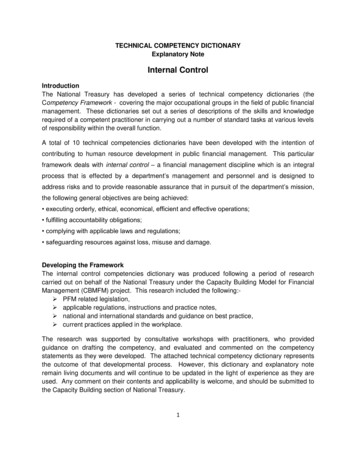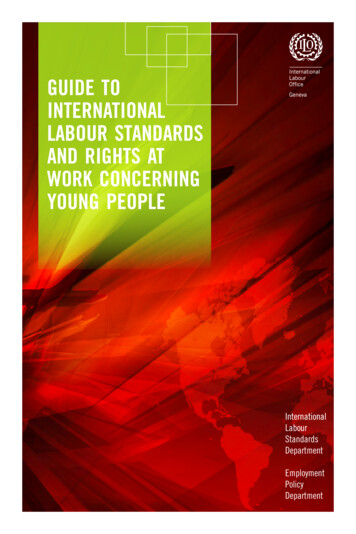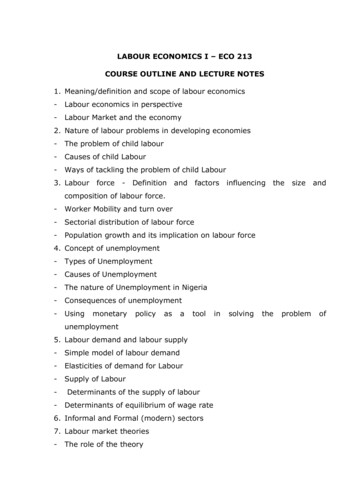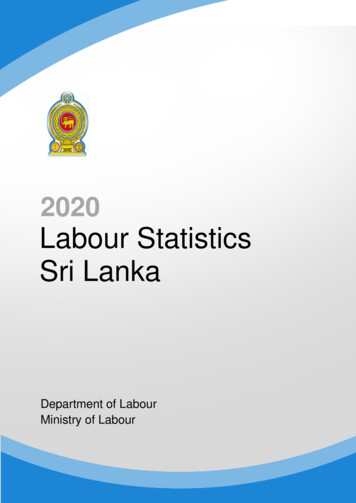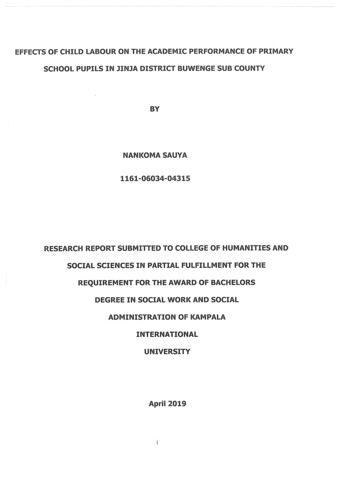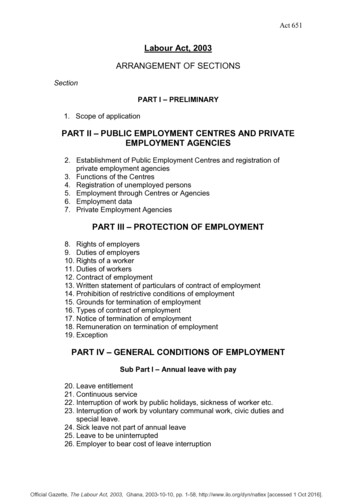
Transcription
Act 651Labour Act, 2003ARRANGEMENT OF SECTIONSSectionPART I – PRELIMINARY1. Scope of applicationPART II – PUBLIC EMPLOYMENT CENTRES AND PRIVATEEMPLOYMENT AGENCIES2. Establishment of Public Employment Centres and registration ofprivate employment agencies3. Functions of the Centres4. Registration of unemployed persons5. Employment through Centres or Agencies6. Employment data7. Private Employment AgenciesPART III – PROTECTION OF EMPLOYMENT8. Rights of employers9. Duties of employers10. Rights of a worker11. Duties of workers12. Contract of employment13. Written statement of particulars of contract of employment14. Prohibition of restrictive conditions of employment15. Grounds for termination of employment16. Types of contract of employment17. Notice of termination of employment18. Remuneration on termination of employment19. ExceptionPART IV – GENERAL CONDITIONS OF EMPLOYMENTSub Part I – Annual leave with pay20. Leave entitlement21. Continuous service22. Interruption of work by public holidays, sickness of worker etc.23. Interruption of work by voluntary communal work, civic duties andspecial leave.24. Sick leave not part of annual leave25. Leave to be uninterrupted26. Employer to bear cost of leave interruptionOfficial Gazette, The Labour Act, 2003, Ghana, 2003-10-10, pp. 1-58, http://www.ilo.org/dyn/natlex [accessed 1 Oct 2016].
Act 651Labour Act, 200327. Record of employment, leave28. Worker may take leave in two equal parts29. Leave entitlement to be restored to suspended worker onreinstatement30. Termination of employment not to affect leave entitlement earned31. Agreement to forgo leave to be void32. Sub-Part not applicable to family concernsSub-Part II – Hours of work33. Maximum hours of work34. Different hours of work35. Paid Overtime36. Shifts37. Manual labourers38. Unpaid overtime39. Commencement and closing of workSub-Part III – Rest periods40. Undertaking to which this Sub-Part applies41. Daily rest period42. Weekly rest period43. Rest periods not to include public holidays44. ExceptionsPART V – Employment of persons with disability45. Registration of persons with disability46. Special Incentives47. Notification of employment of persons with disability48. Particulars of contract of employment49. Persons with disability in public service posts50. Employment not to cease upon disablement51. Length of notice of termination52. Transfer of persons with disability53. Training54. Part to be read as one with other relevant enactmentsPART VI – EMPLOYMENT OF WOMEN55. Night work or overtime by pregnant women56. Prohibition of assignment of pregnant women57. Maternity, annual and sick leave2
Act 651Labour Act, 2003PART VII – EMPLOYMENT OF YOUNG PERSONS58. Prohibition of employment of young persons in hazardous work59. Health of young persons60. Registration of young persons61. InterpretationPART VIII – FAIR AND UNFAIR TERMINATION OFEMPLOYMENT62. Fair termination63. Unfair termination of employment64. Remedies for unfair termination65. Redundancy66. ExceptionsPART IX – PROTECTION OF REMUNERATION67. Payment of remuneration68. Equal pay for equal work69. Prohibited deductions70. Permitted deductions71. Employer not to compel workers to use its store72. Paid public holidaysPART X – SPECIAL PROVISIONS RELATING TO TEMPORARYWORKERS AND CASUAL WORKERS73. Right to employ and application of this Part74. Casual worker75. Temporary worker76. Remuneration of temporary and casual workers77. Payment of remuneration for public holidays78. InterpretationPART XI – TRADE UNIONS AND EMPLOYERS’ORGANISATIONS79. Freedom of Association80. Formation of trade union or employers’ organization81. Organizational rights82. Independence of trade unions and employers organizations83. Application for registration84. Certificate of registration85. Rules of trade unions and employers’ organizations86. Register of trade unions and employers’ organizations3
Act 65187. Protection against discriminationLabour Act, 200388.89.90.91.92.93.94.95.Effect of registrationChange of nameAmalgamationRegistration of change of name and amalgamationAlteration of rulesFederationAccounts and auditAudited financial statementsPART XII – COLLECTIVE 07.108.109.110.111.Collective agreementDuty to negotiate in good faithContents of collective agreementCollective bargaining certificateVariation of certificateNegotiating committeeNegotiations by negotiating committee or joint negotiating committeeNegotiations may be conducted by a union officer or memberFailure to negotiateEffect of collective agreementNotice of collective agreement to workersDuration of collective agreementsProvision for dispute settlementPower to extend collective agreementsEffect of extension of collective agreementsUnion duesPART – XIII NATIONAL TRIPARTITE COMMITTEE112.113.114.115.Establishment of National Tripartite CommitteeFunctions of the National Tripartite CommitteeMeetings of the National tripartite CommitteeRegional and district Tripartite CommitteePART XIV – FORCED LABOUR116. Prohibition of forced labour117. Interpretation of “forced labour”PART XV – OCCUPATIONAL HEALTH, SAFETY ANDENVIRONMENT118. General health and safety conditions119. Exposure to imminent hazards120. Employer to report occupational accidents and diseases4
Act 651121. Specific measuresLabour Act, 2003PART XVI – LABOUR INSPECTION122.123.124.125.126.Labour inspectionAppointment of inspectorsPowers of labour inspectorsinspectors to maintain confidentialityObstruction of inspectorsPART XVII – UNFAIR LABOUR ationInterference by employers in union affairsEmployer to facilitate workers trade union businessInterference that causes financial lossUnion activities during working hoursComplaintsCommission to make ordersAppealsPART XVIII – NATIONAL LABOUR COMMISSIONSub-Part I – Establishment and Functions of the NationalLabour 145.146.147.148.149.150.151.152.Establishment Of CommissionComposition of the CommissionQualification of chairperson and other members of the CommissionFunctions and independence of the CommissionPowers of the CommissionMeetings of the CommissionCommittees of the CommissionAllowances for members of the CommissionTenure of office of membersRegional and District Committees of the CommissionFunctions of a Regional or District CommitteeMeetings of a Regional or a District CommitteeSecretariat for the CommissionExpenditure of the CommissionAccounts and auditReports from Regional and District Labour CommitteesAnnual reports of the CommissionRegulations by the Commission5
Act 651Sub-Part II – Settlement of industrial disputes153. Settlement by negotiations154. MediationLabour Act, 6.167.List of mediators and arbitratorsAppointment of arbitratorsVoluntary arbitrationarbitration awardNotice of intention to resort to strike or lockoutStrike and lockoutCooling-off periodEssential servicesProhibition of strike or lockout in respect of essential servicesCompulsory reference to arbitrationPowers of arbitratorsVacancy in arbitration panelPublication of compulsory arbitration award and effect of arbitrationaward on existing employment contracts.PART XIX – STRIKES168.169.170.171.Illegal strike and lockoutLegal effect of lawful strike or lockoutTemporary replacement of labourPicketingPART XX – cement of orders of the CommissionOffences by body of personsRegulationsInterpretationModification of existing enactmentsRepeals and amendmentSavings and transitional provisionsCommencementSCHEDULES6
Act 651THE SIX HUNDRED AND FIFTY-FIRSTACTOF THE PARLIAMENT OF THE REPUBLICOF GHANAENTITLEDLABOUR ACT, 2003AN ACT to amend and consolidate the laws relating to labour, employers,trade unions and industrial relations; to establish a National LabourCommission and to provide for matters related to these.DATE OF ASSENT: 8th October, 2003.BE IT ENACTED by Parliament as follows:PART I – PRELIMINARYScope of application1. This Act applies to all workers and to all employers except the ArmedForces, the Police Service, the Prison Service and the Security andIntelligence Agencies specified under the Security and Intelligence AgenciesAct 1996 (Act 526).PART II – PUBLIC EMPLOYMENT CENTRES ANDFEE-CHARGING EMPLOYMENT AGENCIESEstablishment of Public Employment Centres and registration of privateemployment agencies2. (1) The Minister shall by Executive Instrument establish PublicEmployment Centres for the discharge of the functions stated in section 3.(2) A Centre established under subsection (1) is answerable to theMinister.Functions of the Centres3. Each Centre shall(a) assist unemployed and employed persons to find suitable employmentand assist employers to find suitable workers from among suchpersons;(b) take appropriate measures to7
Act 651(i)facilitate occupational mobility with a view to adjusting the supplyof labour to employment opportunities in the variousoccupations;(ii)facilitate geographical mobility with a view to assisting themovement of unemployed and employed persons to areas withsuitable employment opportunities; and(iii)facilitate temporary transfers of unemployed and employedpersons from one place to another as a means of meetingtemporary local maladjustment in the supply of or demand forunemployed persons;(c) assist in social and economic planning by providing labour marketinformation to stakeholders to ensure a favourable employmentsituation;(d) provide vocational guidance facilities to young persons;(e) provide arrangements for the registration, employment, training andretaining of persons with disability; and(f) provide arrangements for the registration of employed and unemployedpersons(i)with recognized technical, vocational or professionalqualifications or those without these qualifications but havehad experience of a level higher than that of an artisan;(ii)who are of the level of supervisors or foremen;(iii)with experience at administrative, managerial or seniorexecutive levels; and(iv)who have received training at the tertiary level.Registration of unemployed persons4. (1) An unemployed person may make an application in the prescribedform to the appropriate Centre for registration in the appropriate register.(2) On receipt of the application, the officer in charge of the Center shallenter the particulars of the application in the appropriate register and issueto the applicant a certificate of registration in the prescribed form.Employment through Centres or Agencies5. An employer may employ any worker either through a Centre or a PrivateEmployment Agency.Employment Data6. (1) The Chief Labour Officer or an officer authorized by the Chief LabourOfficer shall, submit to every employer a questionnaire relating to employmentof workers by the employer within the respective Centre.(2) The employer shall complete and return the questionnaire to the ChiefLabour Officer or the authorized officer within fourteen days after the expiry ofevery three months.(3) Where an employer fails or refuses to complete and return thequestionnaire as required under subsection (2) the Chief Labour Officer shalldirect the employer to do so within a specified time, and the employer shallcomply with the direction.8
Act 651Private Employment Agencies7. (1) A person shall not establish or operate a Private Employment Agencyunless that person is a corporate body, has applied to, and has been granteda license by, the Minister.(2) A license granted by the Minister under subsection (1) shall, subject tothe terms and conditions stipulated in the license, be valid for a period oftwelve months.(3) The license of an Agency may be renewed for a period of twelvemonths upon application made to the Minister.(4) There shall be paid by an Agency for the issue or renewal of thelicense such fee as the Minister may by legislative instrument prescribe.(5) An agency may recruit workers for employment in a country outsideGhana if it is authorized to do so under its license and it there exists anagreement between the Government and that other country.(6) An Agency shall submit to the Minister not later than fourteen daysafter the end of every three months returns in respect of workers recruited foremployment, whether in Ghana or outside Ghana, during that period.(7) An Agency shall refund fifty percent of the fees paid by a client to theAgency, if the Agency is unable to secure a job placement for the client afterthe expiration of three months.(8) The Minister shall revoke the license of any Agency that fails tocomply with subsection (6).PART III – PROTECTION OF EMPLOYMENTRights of employer8. Subject to this Act and any other enactment, the rights of an employerinclude the right to(a) employ a worker, discipline, transfer, promote and terminatethe employment of the worker;(b) formulate policies, execute plans and programmes to settargets;(c) modify, extend or cease operations; and(d) determine the type of products to make or sell and the pricesof its goods and services.Duties of employers9. Without prejudice to the provisions of this Act and any other enactment forthe time being in force, in any contract of employment or collective agreement,the duties of an employer include the duty to(a) provide work and appropriate raw materials, machinery,equipment and tools;(b) pay the agreed remuneration at the time and place agreedon in the contact of employment or collective bargainingagreement or by law or agreed between the employer andthe worker;(c) take all practicable steps to ensure that the worker is freefrom risk of personal injury or damage to his or her healthduring and in the course of the worker’s employment or whilelawfully on the employer’s premises;9
Act 651(d) develop the human resources by way of training andretaining of the workers;(e) provide and ensure the operation of an adequate procedurefor discipline of the workers;(f) furnish the worker with a copy of the worker’s contract ofemployment;(g) keep open the channels of communication with the workers;and(h) protect the interests of the workers.Rights of a worker10. The rights of a worker include the right to(a) work under satisfactory, safe and healthy conditions;(b) receive equal pay for equal work without distinction of any kind;(c) have rest, leisure and reasonable limitation of working hours and periodof holidays with pay as well as remuneration for public holidays;(d) form or join a trade union;(e) be trained and retained for the development of his or her skills; and(f) receive information relevant to his or her work.Duties of workers11. Without prejudice to the provisions of this Act, the duties of a worker inany contract of employment or collective agreement, include the duty to(a) work conscientiously in the lawfully chosen occupation;(b) report for work regularly and punctually;(c) enhance productivity;(d) exercise due care in the execution of assigned work;(e) obey lawful instructions regarding the organisation andexecution of his or her work;(f) take all reasonable care for the safety and health of fellowworkers;(g) protect the interests of the employer; and(h) take proper care of the property of the employer entrusted to theworker or under the immediate control of the worker.Contract of employment12. (1) The employment of a worker by an employer for a period of sixmonths or more or for a number of working days equivalent to six months ormore within a year shall be secured by a written contract of employment.(2) A contract of employment shall express in clear terms the rights andobligations of the parties.Written statement of particulars of contract of employment13. Subject to the terms and conditions of a contract of employment betweenan employer and a worker, the employer shall within two months after thecommencement of the employment furnish the worker with written statementof the particulars of the main terms of the contract of employment in the formset out in Schedule 1 to this Act signed by the employer and the worker.10
Act 651Prohibition of restrictive conditions of employment14. An employer shall not in respect of any person seeking employment, orof persons already in his employment(a) require that person to form or join a trade union or to refrain fromforming or joining a trade union of his or her choice;(b) require that person to participate or refrain from participating in thelawful activities of a trade union;(c) refuse to employ the person because of that person’s membershipof a trade union;(d) promise the person any benefit or advantage for not participating intrade union activities; or(e) discriminate against the person on grounds of gender, race, colour,ethnic origin, religion, creed, social or economic status, disability orpolitics.Grounds for termination of employment15. A contract of employment may be terminated,(a) by mutual agreement between the employer and the worker;(b) by the worker on grounds of ill-treatment or sexual harassment;(c) by the employer on the death of the worker before theexpiration of the period of employment;(d) by the employer if the worker is found on medical examinationto be unfit for employment;(e) by the employer because of the inability of the worker to carryout his or her work due to(i)sickness or accident; or(ii)the incompetence of the worker; or(iii)proven misconduct of the worker.Types of contract of employment16. Where by a contract of employment a worker is entitled to be paid,(a) remuneration at a monthly rate, the contract is a contractfrom month to month;(b) remuneration at a weekly rate, the contract is a contract fromweek to week; or(c) remuneration at a rate other than monthly or weekly rate, thecontract is a contract determinable at will.Notice of termination of employment17. (1) A contract of employment may be terminated at anytime by eitherparty giving to the other party,(a) in the case of a contract of three years or more, one month’snotice or one month’s pay in lieu of notice;(b) notice or tow weeks’ pay in lieu of notice; or(c) in the case of contract from week to week, seven days’notice.(2) A contract of employment determinable at will by either party may beterminated at the close of any day without notice.(3) A notice required to be given under this section shall be in writing.11
Act 651(4) The day on which the notice is given shall be included in the period ofthe notice.Remuneration on termination of employment18. (1) When a contract of employment is terminated in the manner stated insection 15, the employer shall pay to the worker,a. any remuneration earned by the worker before thetermination;b. any deferred pay due to the worker before thetermination;c. any compensation due to the worker in respect ofsickness or accident; andd. in the case of foreign contract, the expenses andnecessaries for the journey and repatriation expensesin respect of the worker and accompanying membersof his or her family in addition to any or all of thepayments specified in paragraphs (a), (b) and (c) ofthis subsection.(2) The employer shall pay to the worker not later than the date ofexpiration of the notice all remuneration due to the worker as at thatdate.(3) Where no notice is required, the payment of all remuneration due shallbe made not later than the next working day after the termination.(4) Notwithstanding section 17(1), either party to a contract of employmentmay terminate the contract without notice if that party pays to the otherparty a sum equal to the amount of remuneration which would haveaccrued to the worker during the period of the notice.Exception19. The provisions of sections 15, 16, 17 and 18 are not applicable where ina collective agreement there are express provisions with respect to the termsand conditions for termination of the contract of employment which are morebeneficial to the worker.PART IV – GENERAL CONDITIONS OF EMPLOYMENTSub-Part I – Annual leave with payLeave entitlement20. (1) In any undertaking every worker is entitled to not less than fifteenworking days leave with full pay in any calendar year of continuous service.(2) The expression “full pay” means the worker’s normal remuneration,without overtime payment, including the cash equivalent of anyremuneration in kind.Continuous service21. (1) Continuity of service shall not be regarded as interrupted by merechange of ownership or management of the undertaking.12
Act 651(2) Where the work is not regularly maintained throughout the year, therequirement of continuous service shall be deemed to have been met ifthe worker has worked for not less than two hundred days in theparticular year.Interruption of work by public holidays, sickness of worker22. Public holidays and absence from duty due to sickness certified by amedical practitioner, and pregnancy and confinement, shall not affect theannual leave entitlement of a worker.Interruption of work by voluntary communal work, civic duties andspecial leave23. A period during which a worker is absent from his or her normal dutieswith the permission of the employer on account of the worker’s participation involuntary communal work, the discharge of civic duties or the granting ofspecial leave with or without pay, shall not be counted as part of the worker’sannual leave.Sick leave not part of annual leave24. A period of absence from work allowed owing to sickness, which iscertified by a medical practitioner, and which occurs after the commencementof and during annual leave shall not be computed as part of the leave.Leave to be uninterrupted25. (1) Every worker is entitled to enjoy an unbroken period of leave but anemployer, in cases of urgent necessity, may in accordance with this section,require a worker to interrupt his or her leave and return to work.(2) Where a worker is required by the employer to interrupt his or herleave in the circumstances specified in subsection (1) the worker shall notforfeit the right to the remainder of the leave but shall take the leave anytimethereafter.(3) Where a worker takes his or her annual leave at the end of a calendaryear, the leave may continue except as provided in subsection (1) withoutinterruption, into the following year.Employer to bear cost of leave interrupted26. Any employer who requires a worker to interrupt his or her annual leavein the circumstance stated in section 25, shall make up to the worker anyreasonable expense incurred on account of the interruption, and alsoresumption of the leave by the worker.Record of employment, leave27. (1) A worker shall, as much as may be possible, be given notice of thedate of commencement of his or her annual leave, at least, thirty days beforethe worker takes the leave.(2) Every employer is required to keep a record showing the followingparticulars,13
Act 651(a) the date of employment of each worker employed by theemployer and the duration of the annual leave to which the workeris entitled;(b) the dates on which the annual leave is taken by each worker;and(c) the remuneration received by each worker in respect of theannual leave.Worker may take leave in two equal parts28. Without prejudice to the provisions of this Sub-Part, a worker may bepermitted to take his or her annual leave in two approximate equal parts.Leave entitlement to be restored to suspended worker on reinstatement29. Where a worker, suspend from the service of his or her employer prior todisciplinary or criminal proceedings being taken against him or her isreinstated, the worker shall be entitled to take the leave he or she would havehad if he or she had not been suspended.Termination of employment not to affect leave entitlement earned30 (1) Where the employment of a worker is terminated, the worker isentitled to annual leave in proportion to the period of service in the calendaryear.(2) The worker shall not be deprived of any other grants or awards towhich the worker is entitled including payment in lieu of notice of termination.(3) Subsections (1) and (2) do not apply to cases where the employer hasthe right to dismiss a worker without notice.Agreement to forgo leave to be void31. Any agreement to relinquish the entitlement to annual leave or to forgosuch leave is void.Sub-Part not applicable to family concerns32. This Sub-Part does not apply to a person employed in an undertaking inwhich only members of the family of the employer are employed.Sub-Part II – Hours of workMaximum hours of work33. The hours of work of a worker shall be a maximum of eight hours a dayor forty hours a week except in cases expressly provided for in this Act.Different hours of work34. The rules of any undertaking or its branch may prescribe hours of workdifferent from eight hours a day on one or more days in the week, subject tothe following,a. Where shorter hours of work are fixed, the hours ofwork on the other days of the week may beproportionately longer than eight hours but shall not14
Act 651exceed nine hours a day or a total of forty hours aweek;b. here longer hours of work are fixed the averagenumber of hours of work reckoned over a period offour weeks or less shall not exceed eight hours a dayor forty hours a week; orc. In the case of an undertaking the work of which is of aseasonal nature, where longer hours of work are fixed,the average number of hours of work over a period ofone year shall not exceed eight hours a day exceptthat the hours of work which may be fixed under thisparagraph shall not exceed ten hours a day.Paid overtime35. (1) Subject to subsections (2) and (3), where a worker in an undertakingworks after the hours of work fixed by the rules of that undertaking, theadditional hours done shall be regarded as overtime work.(2) A worker in any such undertaking may not be required to do overtimework unless that undertaking has fixed rates of pay for overtime work.(3) A worker shall not be compelled to do overtime work except forundertakings or enterprises(a) the very nature of which requires overtime in order to be viable; or(b) which are subject to emergencies that require that workers engagein overtime work in order to prevent or avoid threat to life and property.Shifts36. Workers may be employed in shits, but the average number of hoursreckoned over a period of four weeks or less shall not exceed eight hours aday or forty hours a week if there is an established time-table for the shifts.Manual labourers37. (1) The Minister may prescribe shorter hours of work for workers in jobsdeclared to be manual labour and in jobs likely to be injurious to health.(2) Work for which shorter hours are prescribed under section (1) shallbe deemed to be equivalent to work done on the basis of eight hours a day forthe purpose of all rights which may flow from the employment.Unpaid overtime38. Notwithstanding section 35, a worker may be required to work beyondthe fixed hours of work without additional pay in certain exceptionalcircumstances including an accident threatening human lives or the veryexistence of the undertaking.Commencement and closing of work39. The time of commencement and closing of a worker’s hours of work inany undertaking shall be fixed by the rules of the undertaking concernedsubject to the following:a. in the case of operations underground, workcommences when the worker enters the cage15
Act 651or lift to go down and ends when the workerleaves it at the surface; andb. in the case of operations underground, wherethe work place is reached by going down agallery, the hours of work is reckoned from thetime when the worker enters the gallery to thetime when he or she leaves it at the surface.Sub-Part III – Rest periodsUndertakings to which this Sub-Part applies40. In any undertaking(a) where the normal hours of work are continuous, a worker isentitled to at least thirty minutes break in the course of the work, but thebreak forms part of the normal hours of work; and(b). where the normal hours of work are, in two parts, the break shouldnot be of less than one hour duration and does not form part of thenormal hours of work.Daily rest period41. (1) Without prejudice to section 40, a worker shall be granted a dailycontinuous rest of at least twelve hours duration between two consecutiveworking days.(2) The daily rest of the worker in an undertaking operating on a seasonalbasis may be of less than ten hours but of not more than twelve hours’duration over a period of at least sixty consecutive days in the calendar year.Weekly rest period42. A worker shall, in addition to the rest periods provided in sections 40 and41, be given a rest period of forty-eight consecutive hours, in every sevendays of normal working hours, and the rest period may, for preference, startfrom Saturday and end on the Sunday following and shall wherever possible,be granted to all of the workers of the undertaking.Rest periods not to include public holidays43. The rest periods specified in this Sub-Part do not include public holidays.Exceptions44. This Sub-Part and sections 33 and 34 do not apply to task workers ordomestic workers in private homes.PART V – EMPLOYMENT OF PERSONS WITH DISABILITYRegistration of Persons with disability45. (1) A person with disability may apply to the Centre for registration.(2) The Centre shall upon registration of person with disability, issue theperson a certificate of registration in a form determined by the Chief LabourOfficer.16
Act 651Special incentives46. (1) Special incentives shall be provided to an employer who employspersons with disability.(2) Special incentives shall be given to a person with disability engagedin a business or enterprise.(3) The special incentives shall be determined by the Minister.Notification of employment of persons with disability47. An employee who employs a person with disability shall notify thenearest Centre of the employment and where the employer fails to do so, theChief Labour Officer shall direct the employer to comply.Particulars of contract of
Act 651 Labour Act, 2003 ARRANGEMENT OF SECTIONS Section PART I - PRELIMINARY 1. Scope of application PART II - PUBLIC EMPLOYMENT CENTRES AND PRIVATE EMPLOYMENT AGENCIES 2. Establishment of Public Employment Centres and registration of private employment agencies 3. Functions of the Centres 4. Registration of unemployed persons 5. Employment through Centres or Agencies 6. Employment data 7 .
